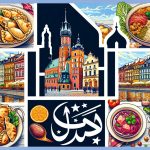
In Poland, the New Year is celebrated with a mix of old traditions and modern fun. People share opłatek, a kind of wafer, and make special meals that are supposed to bring good luck. There are also big public parties and fireworks that light up the skies in cities.
But there are also some less common traditions and beliefs that are part of the Polish New Year’s celebration. Looking into these unique practices gives us a better understanding of how Poles celebrate New Year’s Day and what it says about their culture and values.
The Eve’s Festive Spirit
In Poland, the New Year’s Eve celebration is a lively event that brings together traditional customs and modern festivities. This special day acts as a bridge connecting the past year with the new one, filled with hope and anticipation. People across the country participate in both public and private events, making this occasion a significant part of Polish culture.
Outdoor celebrations are common, with streets lighting up with fireworks and live music, creating a festive atmosphere. These events are not only about having fun but also about coming together as a community to welcome the New Year. For example, many cities organize concerts featuring popular local artists, offering free entertainment that attracts residents and tourists alike.
At the same time, many Poles prefer celebrating at home, surrounded by family and friends. These gatherings often involve sharing meals, reflecting on the past year, and discussing hopes for the future. It’s a time for personal connection and setting intentions for the year ahead.
An interesting tradition in Poland is the sharing of ‘oplatek,’ a thin wafer. During New Year’s Eve or Christmas Eve, people break this wafer with each other while offering good wishes. This ritual symbolizes forgiveness and unity, highlighting the importance of relationships and community as the New Year begins.
The blend of public joy and private reflection on New Year’s Eve in Poland showcases how deeply this celebration is woven into the fabric of Polish society. It’s a day that honors both the collective spirit of the community and the individual aspirations of its members, making it a truly meaningful occasion.
Traditional New Year’s Foods
In Poland, the New Year celebration is incomplete without specific traditional foods. These dishes are more than just meals; they carry deep cultural meanings and express wishes for prosperity and joy in the coming year. For example, herring is a must-have because it’s believed to attract wealth. Its shiny scales are thought to resemble coins, promising financial success. Then, there’s the poppy seed, often seen in desserts like the poppy seed roll, or makowiec. Eating poppy seeds is expected to bring happiness and tranquility.
Another significant tradition is sharing oplatek, a thin wafer. This act is not just about eating; it’s a symbol of unity and forgiveness among community members. It sets a hopeful and positive tone for the new year, emphasizing the importance of relationships and goodwill.
These customs are not randomly chosen; they have been part of Polish New Year’s celebrations for centuries, reflecting the society’s values and hopes. By enjoying these foods, Poles connect with their heritage and express their wishes for the future in a tangible, communal way. Through these culinary traditions, the New Year’s celebration becomes a meaningful event that combines eating, cultural expression, and the aspiration for a better year ahead.
Music and Dance Celebrations
In Poland, New Year’s celebrations are incomplete without the vibrant beats of music and the joyous steps of dance. These elements are more than just entertainment; they are vital threads that weave together the country’s rich cultural fabric.
Music in Poland during these festivities spans a wide range, from traditional folk melodies to the latest pop hits. This variety ensures that everyone, regardless of age or taste, finds something that resonates with them, setting the perfect mood for the celebrations.
Dancing is equally significant, bringing people together in a shared experience of joy and tradition. Among the dances, the Polonez and Mazurka stand out for their historical significance, offering a window into Poland’s past. These traditional dances are not just performances but interactive experiences that invite everyone to join in, creating a sense of unity and belonging.
Imagine walking through a Polish town on New Year’s Eve. You would likely hear music spilling out from homes and public squares, each playing a different tune but all contributing to a festive atmosphere. You might see groups of people, from young children to grandparents, dancing together, laughing, and sharing stories. This scene perfectly captures the essence of Poland’s New Year’s celebrations: a community coming together to celebrate their heritage and create new memories.
These celebrations do more than just mark the start of a new year; they reinforce the social bonds within the community. By participating in these traditional dances and enjoying the familiar strains of music, Poles reaffirm their connection to each other and to their cultural roots. This sense of belonging and pride is what makes the New Year’s celebrations in Poland so special.
In a nutshell, Poland’s New Year’s festivities are a vibrant expression of its cultural heritage, bringing together music and dance in a celebration of community, tradition, and joy. Whether it’s through the lively steps of the Mazurka or the communal experience of singing along to a beloved folk song, these elements play a crucial role in connecting Poles to their national identity and to each other, making the New Year an occasion of meaningful celebration.
Fireworks and City Events
In Poland, the New Year’s celebrations are a big deal, filled with music, dance, and especially, fireworks. These events show off Poland’s rich culture and how much its people enjoy getting together. Cities all over Poland plan special events for everyone, making sure nobody feels left out. Places like central squares become the heart of the celebration, with fireworks lighting up the sky. This is more than just a show; it symbolizes new beginnings and brings people together, highlighting the importance of community in Polish culture.
For example, in the capital city of Warsaw, you can expect an array of concerts featuring local and international artists, drawing crowds from all walks of life. These are not just concerts, but gatherings that bring people closer, creating unforgettable memories. Meanwhile, in Krakow, the historic main square hosts a night market with traditional Polish food and crafts, offering a taste of the country’s heritage.
What’s special about these celebrations is not just the entertainment but the feeling of unity they foster. It’s a time when everyone, regardless of their background, comes together to welcome the New Year. This sense of belonging is crucial in today’s world, and Poland’s New Year’s celebrations are a perfect example of how traditions can bring us closer.
Family and Home Traditions
In Poland, welcoming the New Year is more than just watching fireworks; it’s about embracing family traditions that strengthen bonds and celebrate cultural heritage. These customs connect generations, showcasing the enduring spirit of Polish culture. Families come together for a special feast that’s carefully prepared with dishes thought to bring good fortune and health in the upcoming year. This focus on homemade meals highlights the importance of care and togetherness.
One unique tradition is the sharing of opłatek, a Christmas wafer, among family members. This act symbolizes a fresh start by promoting forgiveness and reconciliation. It’s a powerful way to begin the year on a positive note, reinforcing family connections and setting collective goals for happiness and renewal.
For example, imagine sitting around the dinner table, passing the opłatek from person to person, each sharing their wishes for one another. This moment isn’t just about the ritual itself but about creating memories and reinforcing the idea that family is a source of strength and support.
In a conversational tone, let’s think about how these traditions might inspire us. Perhaps we could adopt a similar practice in our own families, regardless of cultural background. Sharing a moment of reflection and hope with loved ones can be a meaningful way to start the year. It’s about more than the specific dishes we eat or the rituals we follow; it’s about the love and connections that these traditions foster.
Conclusion
Wrapping it up, celebrating New Year’s in Poland is a big deal that shows off the country’s rich culture and love for modern parties. Poles dive into the New Year’s Eve excitement, savor traditional dishes, groove to music, watch fireworks, and cherish family customs.
Together, these activities kick off the new year, showing a deep respect for Polish traditions and a shared hope for what’s to come.






Comments are closed.